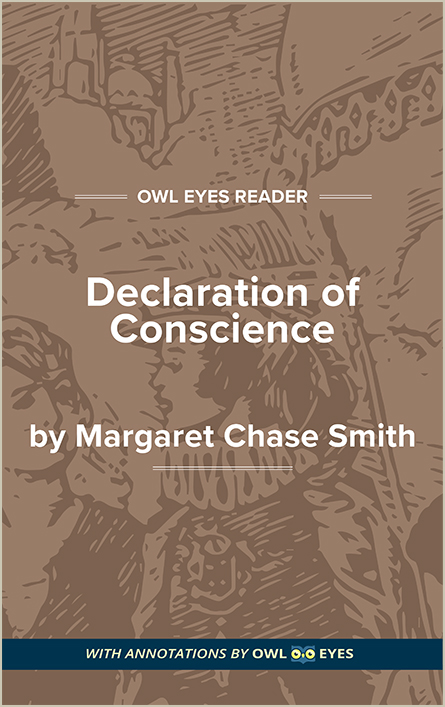Analysis Pages
Themes in Remarks to the Senate in Support of a Declaration of Conscience
Patriotism before Party: Throughout her speech, Smith emphasizes the importance of “Americanism” and doing the right thing for the people of the United States. Rather than relying solely on her status as a Republican or a US Senator, Smith also presents herself as a US citizen and a woman, blending her private identities with her public ones. She states that she does want a Republican victory in the next election, but that she is not willing to deliver a “lasting defeat [to] the American people” in order to achieve that victory. In order to further enhance the theme of patriotism, Smith references the US Constitution and the Bill of Rights. These references serve to position Smith as a patriot who seeks to protect her country from the reckless rhetoric espoused by McCarthy, further aligning her with the American people.
Pride as a Republican Official: Many of Smith’s arguments are rooted in the claim that the Republican Senators should be ashamed of the tactics they have stooped to. She encourages them to reject McCarthyism as a matter of pride, calling on the history of the Republican party to encourage them to revise their tactics. By alluding to Abraham Lincoln, Smith advocates for “unity and prudence” in the face of McCarthy’s divisive and reckless rhetoric. She also offers her fellow Republican Senators the chance to be “champions” of the American people. Throughout the speech, she often begins statements with the word “surely,” highlighting her belief that the US Senate can and should be better, evoking shame in her audience.
The Dangers of Divisive Rhetoric: Smith encourages the Republican party to become the party of “unity and prudence,” recalling the first Republican President, Abraham Lincoln, who held the Union together during the American Civil War. By alluding to Lincoln and the Civil War, she reminds her colleagues and the American people of the dangers of societal division and infighting. She further warns that to allow McCarthy to remain unchecked is to play into the hands of the United States’ “enemies.” Smith posits that by leaving Americans “confused” and “divided” rather than united against the greater threat of Communism, McCarthy is actually supporting the goals of the enemy he claims to be combatting.
Themes Examples in Remarks to the Senate in Support of a Declaration of Conscience:
Text of Senator Smith's Speech
🔒"it would be a more lasting defeat for the American people...." See in text (Text of Senator Smith's Speech)
"the champion of unity and prudence...." See in text (Text of Senator Smith's Speech)
"Freedom of speech is not what it used to be in America. It has been so abused by some that it is not exercised by others...." See in text (Text of Senator Smith's Speech)
"Who of us doesn't?..." See in text (Text of Senator Smith's Speech)
" The right to criticize; The right to hold unpopular beliefs; The right to protest; The right of independent thought...." See in text (Text of Senator Smith's Speech)
"I speak as a Republican, I speak as a woman. I speak as a United States Senator. I speak as an American...." See in text (Text of Senator Smith's Speech)
"irresponsible words of bitterness and selfish political opportunism...." See in text (Text of Senator Smith's Speech)

